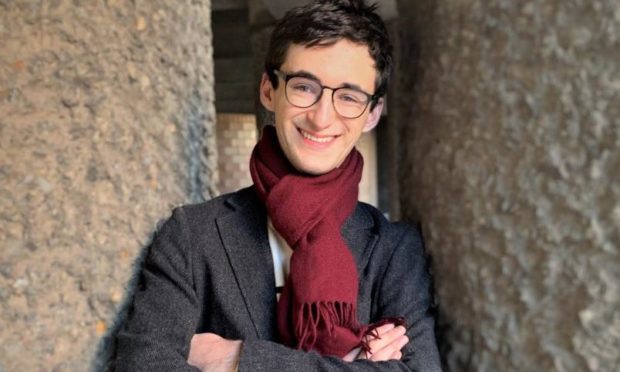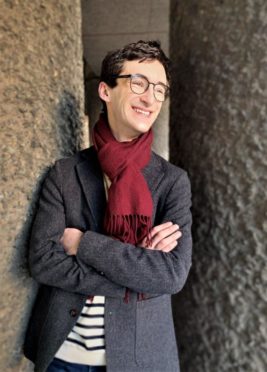From the rural delights of Glenduckie to the bright lights of London, 19-year-old Kit McCarthy has had a strange first year away from home.
In his first year of a composition course at the Guildhall School of Music and Drama, Kit has missed the normal buzz of student life in London. Instead of heading out to the wealth of concerts, galleries and museums that he could have enjoyed, he describes his first year as “seeing only my computer screen, the courtyard outside my bedroom, and not much else.”
This isn’t the young man to talk to about the latest Netflix series though. Kit has had his head deep in sheet music, after winning a commission for a composition related to what might be the longest public art project in the world.
Building bridges
The Illuminated River project spans 15 bridges across the Thames in central London, with lighting designed by architects Lifschutz Davidson Sandilands with New York artist Leo Villareal.
When the project was looking for new music inspired by each of the bridges it reached out to the Guildhall, who the offered students the chance to pitch to compose a piece for a bridge inspired by its surroundings and history.
Kit has been successful in composing the piece for Waterloo Bridge, which was recorded on March 30 by the Guildhall Orchestra, made up of recent graduates. He says it should be available to hear as a complete piece soon.
Although Kit has been playing music from an early age, he considered going into law. Some people might recall him as the active young MYSP who was at the forefront of the campaign to ban mosquito devices, the high-pitched sound that could only be heard by people under the age of 25.
He decided that composition was a better fit for him, however, and after applying to several conservatoires, decided on Guildhall. So the former Bell Baxter and St Leonard’s pupil went straight from school to London last September to begin the course.
“I started French Horn when I was about seven, taught by a wonderful woman called Margaret Douglass, primarily an astrophysicist, who taught that at St Andrews University. Her real passion has always been teaching kids French Horn and particularly jazz French Horn! For the best part of 10 years I was taught by her,” says Kit.
He says he pretty much taught himself to compose, along with musician friends and bits he picked up at school, and even though he played in orchestras, including the National Youth Orchestra of Scotland, he doesn’t think he was ever a good enough player to do that professionally.
“Thank goodness I prefer composition. I’m a pretty mediocre piano player and I do want to get better at that. I know that will be helpful in composition.”
Home is where the art is
Kit’s mother is a doctor and his father has lived a creative life, working as a lecturer in creative writing and art history, and an author.
“My dad was a semi-professional musician. He did some opera singing and had an early music chamber group for a while. My parents are both musical and even if they didn’t teach me, I could play them things I had composed and they could tell me what they did and didn’t like about it.”
Pop music didn’t play much of a part in his early life. “I think it was because my parents didn’t listen to it and being an only child I didn’t have the influence of siblings.
“In fact pop music felt slightly shameful for a while. I would go through to breakfast and Radio 3 would be playing – it would be Monteverdi or Schumann or something similar.
“Pop music felt slightly shameful for a while. I would go through to breakfast and Radio 3 would be playing – it would be Monteverdi or Schumann or something similar.”
“I started to listen to pop music at school, quite furtively, on an MP3 player. Now I like a bit of everything – jazz, Scottish music, world music – all genres, all eras.”
Kit found out his pitch for Waterloo Bridge was successful during his Christmas break and had to hurriedly finish it. “I am happy with it and hearing the Guildhall musicians recording it was pretty thrilling.
“There are so many paths you can follow in composition,” he adds. “Concert music, film and TV music, education, music for theatre, dance, opera…
“Mind you it’s always been hard to earn a living as a musician or a composer and I think it’s even harder now.
“That’s why it’s been so great to have this opportunity so early in my musical career.”

